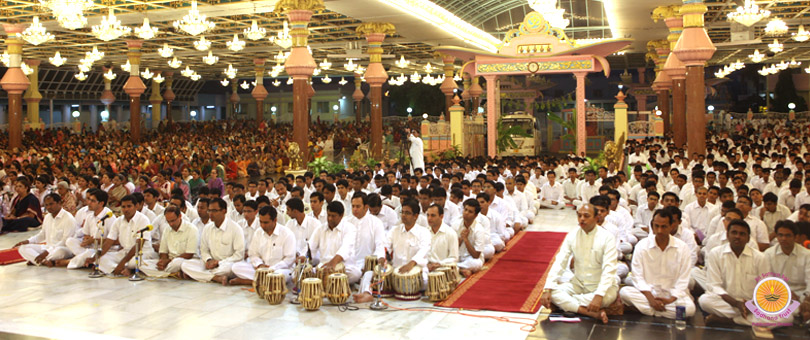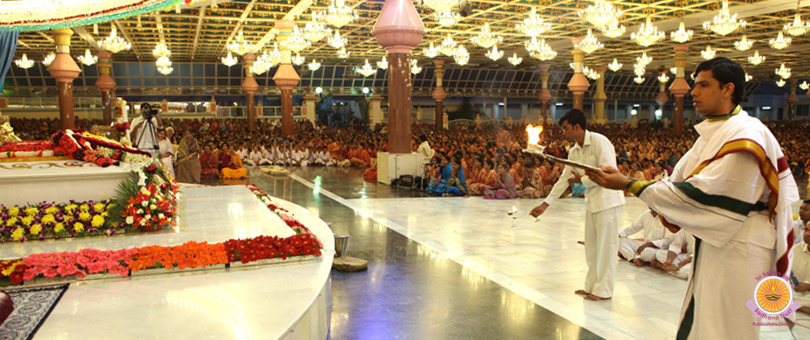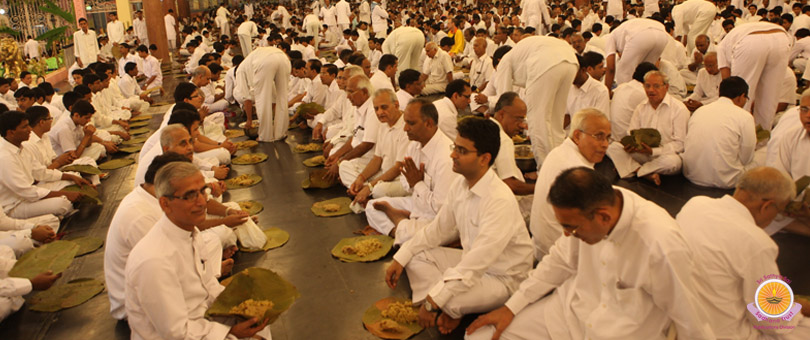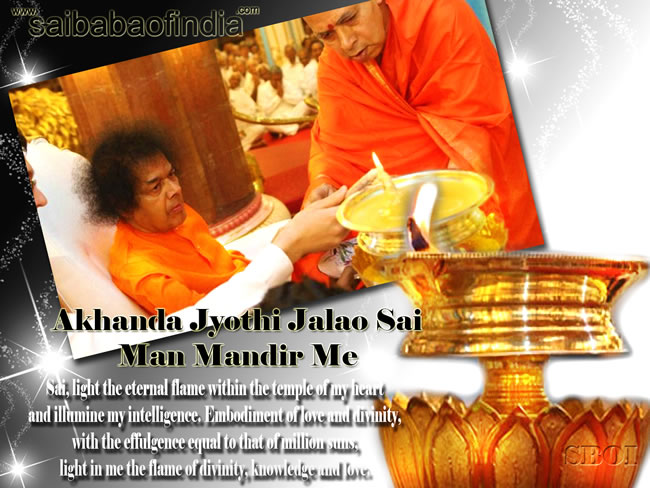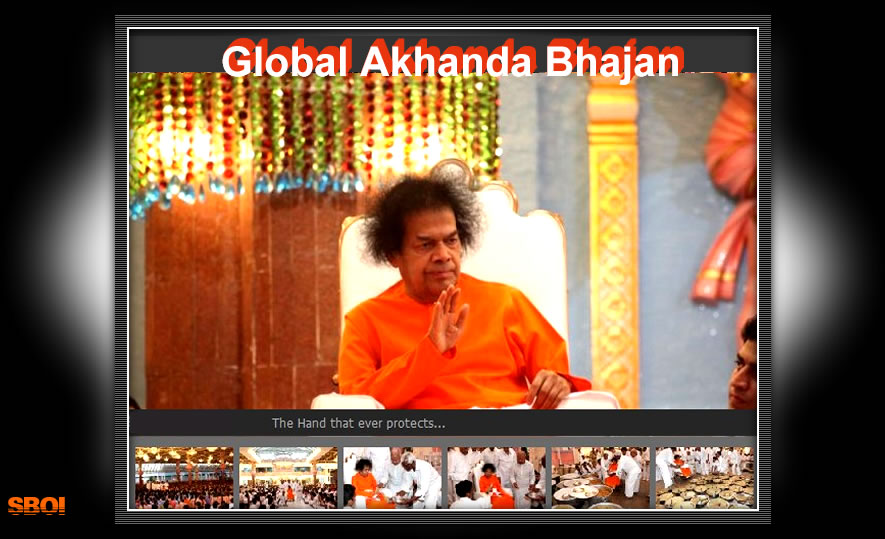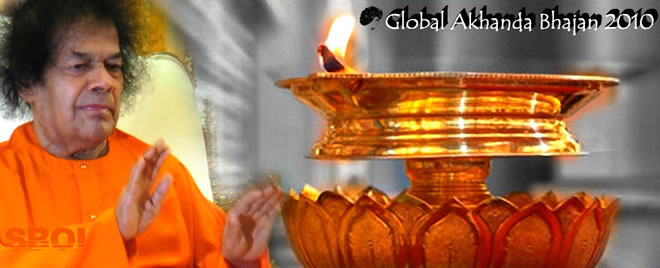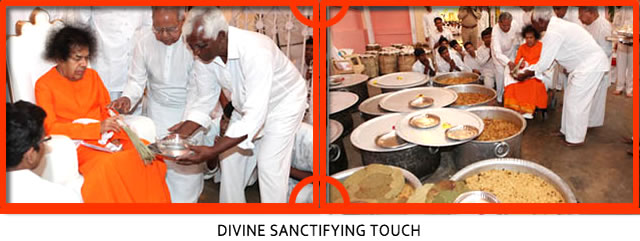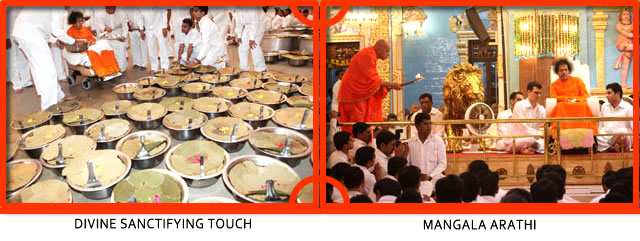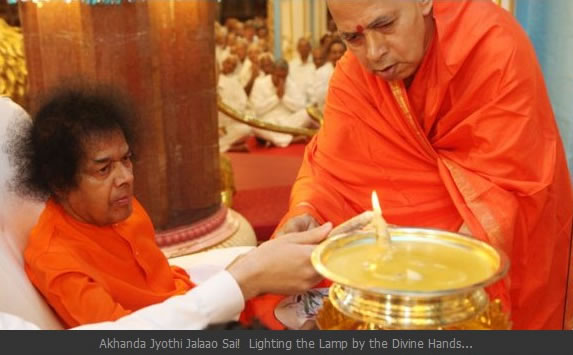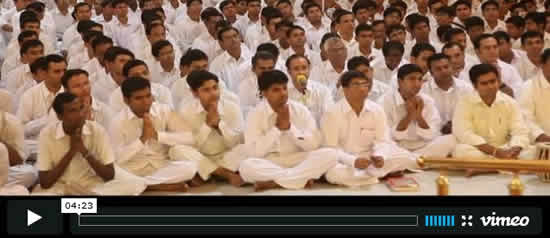Follow
Us: |
| ||||||||||||
| Text & photo source - copyrights: Sri Sathya Sai Sadhana Trust - sssbpt.org - Radiosai.org Prasanthi Diary - theprasanthireporter.org | Web layout - Photo graphic design : saibabaofindia.com "SBOI" | - We gratefully acknowledge the publishers Sri Sathya Sai Sadhana Trust & Sri Sathya Sai Media Foundation | ||||||||||||
| ||||||||||||
| ||||||||||||
Current Global Akhanda Bhajan Updates - Photos - Video - click here | ||||||||||||
| Sai Baba Darshan News & Photo Latest Updates | ||||||||||||
|
| ||||||||||||
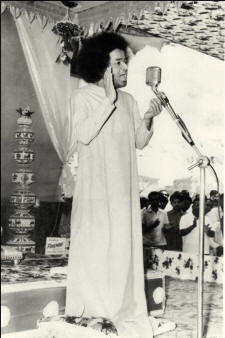
| ||||||||||||
| Archive: | ||||||||||||
| Glittering Prasanthi witnesses grand culmination of Akhanda Bhajan… Monday, November 11th, 2013
| ||||||||||||
A glittering Sai Kulwant Hall embraced Beloved Bhagawan’s ‘endearing presence’ with a couple of bhajans in His mellifluous voice echoing the holy precincts marking the culmination of 24 hour non-stop bhajan sadhana, Akhanda Bhajan, this evening here in Prasanthi Nilayam. 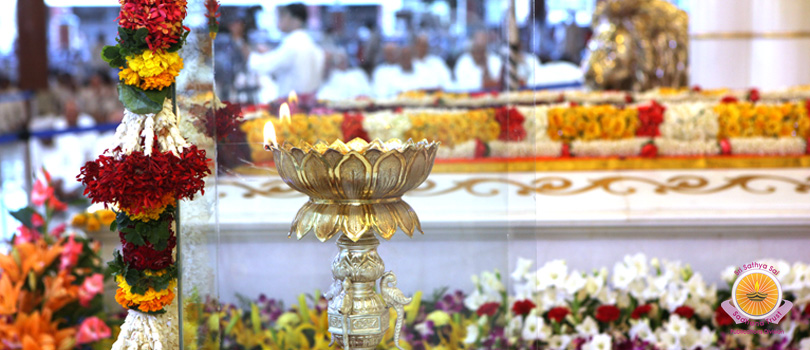
The two bhajans in Bhagawan’s voice were “Govinda Krishna Jai…” and “Subramaniam Subramaniam…”.
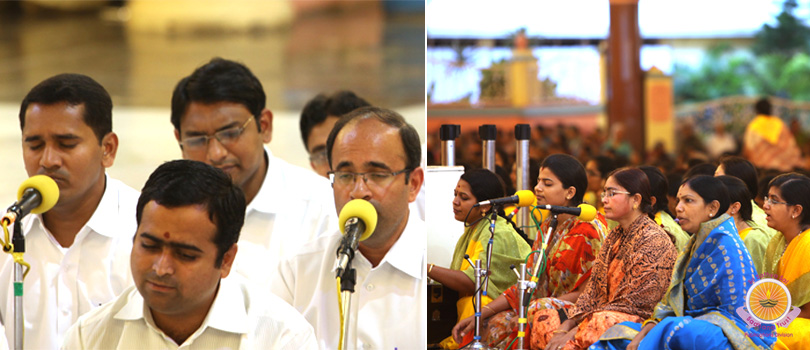
The 24-hour Bhajans saga commenced yesterday evening at 1800 hrs. and continued non-stop till this evening at 1800 hrs. The entire exercise, aimed at promoting world peace and harmony, was a thrilling experience reliving the golden past with Beloved Bhagawan, where He would bless the occasion with His towering physical presence, guiding at each and every step, blessing Prasanthi and the entire world with His all-conquering love.
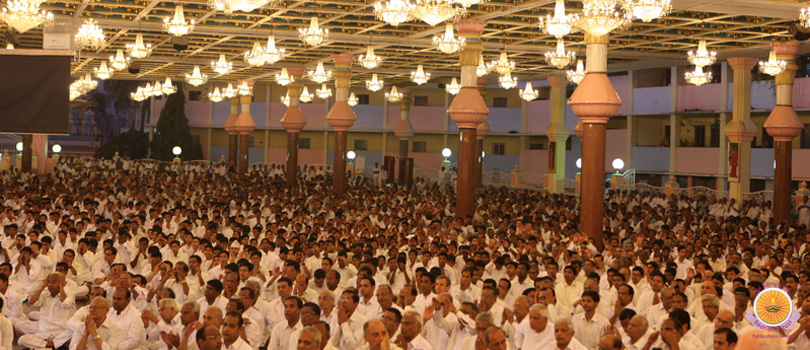
It was time for Prasadam. Swarms of students spread themselves across the spacious Sai Kulwant, ably assisted by sevadal volunteers, distributing blessed Prasadam, tamarind rice and sweet pudding, to the entire assemblage. Strictly adhering to Bhagawan’s injunction to chant the Food Prayer, students soon burst in to “Brahmarpanam…” joined by the entire audience.
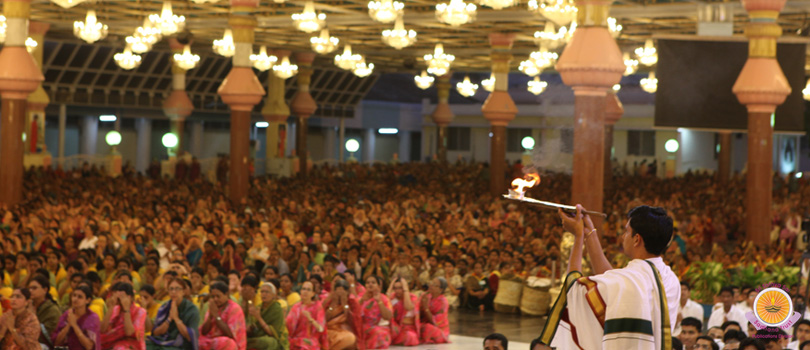
The Akhanda Bhajan had its origin way back in 1945, started in Bangalore by a group of eight families. Upon the culmination of the year-long Thursday bhajans, they had been conducting quite regularly from 1944, during the World War II time, the group of eight families showed up to Bhagawan in Puttaparthi seeking blessings for conducting bhajans. The Divine Visionary that He is, Bhagawan blessed the group, praising the idea of bhajan singing and named it Akhanda Bhajan. He even promised the group that He would officiate the same. This grand Spiritual exercise has been going on uninterrupted ever since.
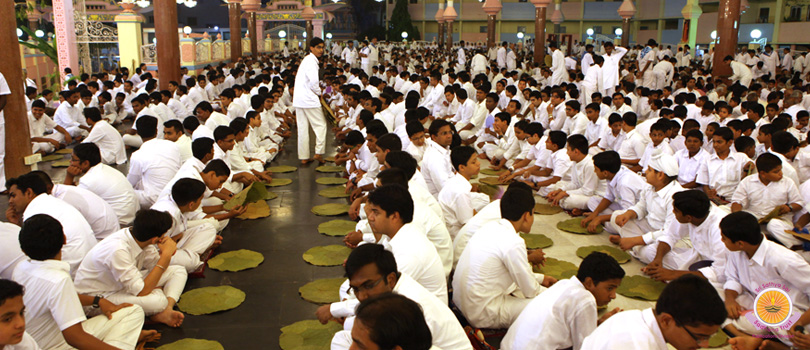
II Samastha Lokaha Sukhino Bhavantu II
| ||||||||||||
Akhanda Jyothi Jalaao Sai Mana Mandir Mein…Sunday, November 11th, 2012
| ||||||||||||
| With the theme bhajan Akhanda Jyothi Jalaao Sai Mana Mandir Mein…, praying Bhagawan to light the lamp of eternal love and wisdom, echoing in the spacious Sai Kulwant Hall, Akhanda Bhajan 2012 got off to a sublime beginning this evening here in Prasanthi Nilayam. Bhajans are on with students, both boys and girls from Prasanthi Nilayam and Anantapur Campus respectively singing in alternate turns..
Earlier the bhajans commenced with an invocatory Ganesha bhajan, sung with an aalap. An announcement on the Darshan schedules for tonight and tomorrow and about Prasadam at the end of the bhajans was announced before the commencement of the bhajans.
The 24-hour Akhanda Bhajans will culminate tomorrow evening at 1800 hrs. with Mangala Arathi. II Samasta Lokah Sukhino Bhavantu II
| ||||||||||||
| A glittering Sai Kulwant Hall embraced Beloved Bhagawan’s ‘endearing presence’ with a couple of bhajans in His mellifluous voice, echoing the holy precincts, marking the 24 hour non-stop bhajan sadhana, Akhanda Bhajan, this evening (November 11, 2012) here in Prasanthi Nilayam. The two bhajans in Bhagawan’s voice were “Manasa Bhajanre Guru Charanam…” and “Subhramanyam, Subhramayam…”
At the end of the bhajan, Mangala Arathi was offered at 1800 hrs. followed by prasadam, tamarind rice and sweet pudding, distribution to the entire assemblage of devotees.
II Samasta Lokah Sukhino Bhavantu II
| ||||||||||||
| Archive:
| ||||||||||||
Akhanda Bhajan 2011 culminates with devotional fervour…A glittering Sai Kulwant Hall embraced Beloved Bhagawan’s ‘endearing presence’ with a couple of bhajans in His mellifluous voice echoing the holy precints marking the 24 hour non-stop bhajan sadhana, Akhanda Bhajan, this evening here in Prasanthi Nilayam. The two bhajans in Bhagawan’s voice were “Hari Bhajan Binaa Sukha Shanthi Nahi…” and “Prema Muditha Manase Kaho Rama Rama Ram…” that summed up the purport of bhajan singing, that should be done with a mind and heart immersed in love for God. 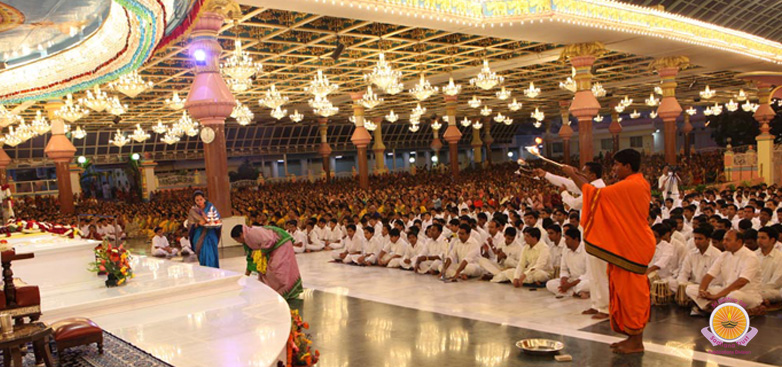 Earlier stundets who spearheaded the entire exercise with devotion and discipline ended their stint ten minutes to the scheduled hour, at 1750, with the customary final bhajan that had been in practice during earlier years in Prasanthi, “Subramaniam Subramaniam…”. Video: Akhanda bhajans 2011 - 12-11-2011
It was time for Prasadam. Swarms of students spread themselves across the spacious Sai Kulwant, ably assisted by Sevadal volunteers, distributing blessed Prasadam, Tamarind Rice and Sweet Pudding, to the assemblage. Following Bhagawan’s injuction to chant the Food Prayer, students soon burst in to “Brahmarpanam…” joined by the entire audience. 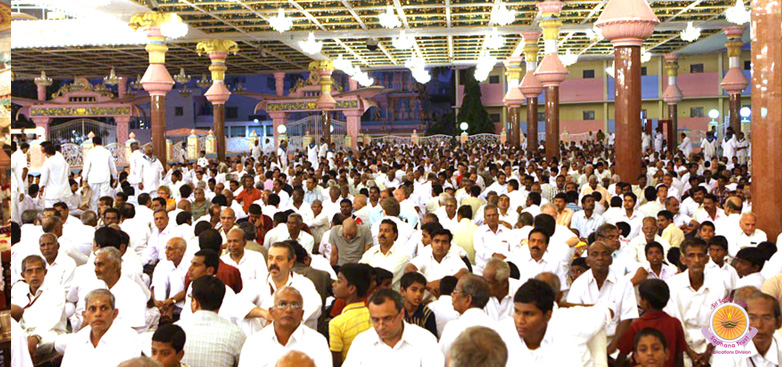 The entire exericise aimed at promoting world peace and harmony was a thrilling experience reliving the golden past with Beloved Bhagawan, where He would bless the occasion with His towering physical presence, guiding each and every step, blessing Prasanthi and the entire world with His all conquering love. The 24 hour Bhajans was started in Bangalore in the year 1945 by the eight families that first came to Puttaparthi as a culmination of the year long Thursday Bhajans that they had commenced an year earlier during the time of World War II. When they wrote to Bhagawan seeking permission for the same, Bhagwan blessed the idea, named it Akhanda Bhajan and promised them that He will attend it as well. This grand Spiritual Exercise has been going on uninterrupted ever since.
| ||||||||||||
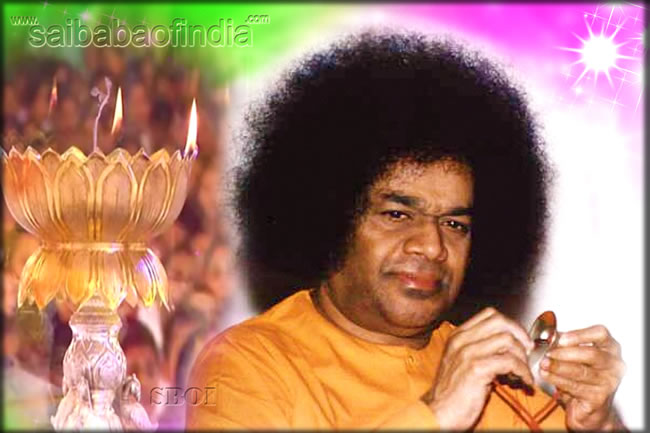 | ||||||||||||
Saturday, November 12, 2011: Global Akhanda Bhajan 2011 commenced this evening at 1800 hrs. here in Prasanthi Nilayam. When the theme bhajan for this twenty-four hour spiritual exercise, “Akhanda Jyothi Jalaao …Sai Mana Mandir Mein” echoed in Prasanthi, thousands assembled in the resplendent Sai Kulwant Hall joined in chorus sinking in nostalgic memoirs of the golden past when Bhagawan would officiate the Akhanda Bhajan. Bhajans continued with boys and girls from Prasanthi Nilayam and Anantapur Campus sang in alternate turns.. 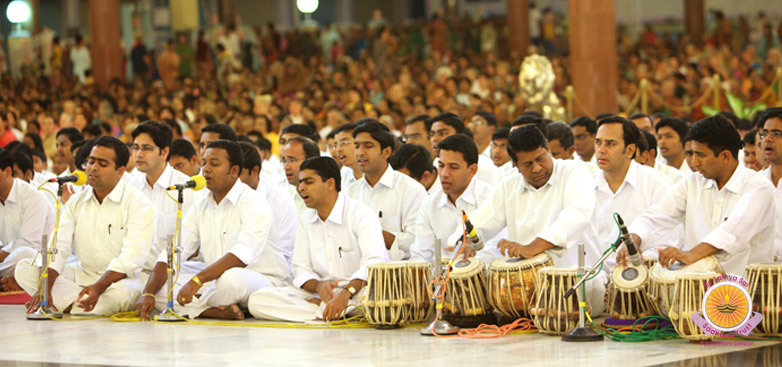
Earlier the bhajans commenced with invocatory Ganesha bhajan, sung with aalap, “Suklambharadaram Vishnum…”. An announcement on the Darshan schedules for tonight and tomorrow and about Prasadam at the end of the bhajans was announced before the commencement of the bhajans. Various groups of devotees would sing in turns during the entire night before students once again take over in the morning.
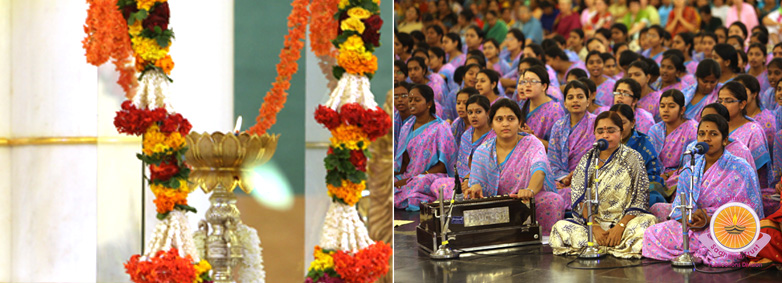
click here: Photos from last year's Akhand Bhjans in Prasanthi Nilayam
| ||||||||||||
| ||||||||||||
Global Akhanda Bhajan“You too must pass your days in song. Let your whole life be a bhajan. Believe that God is everywhere at all times, and derive strength, comfort and joy by singing His Glory in His Presence. Let melody and harmony surge up from your hearts and let all take delight in the Love that you express through that song.” said Bhagawan in an exclusive Divine Discourse delivered on 14th Nov 1976 on the occasion of Global Akhanda Bhajan. Of all the Sai programmes for promoting Harmony and Unity among the peoples of the world nothing is so significant and far‑reaching as the observance of “Akhanda Bhajan “on a global scale, initiated by Bhagawan. It represents a unique attempt at making people in every part of the world conscious of their Divine essence and to experience the sense of oneness spiritually. The Akhanda Bhajan, which is observed by Sathya Sai Centres in all countries, from Tokyo in Japan to Vancouver in Canada, from Fiji in the Pacific to Trinidad in the Caribbean, has become over the years one of the most looked‑for event in the Prasanthi calendar. A simple exercise started over a quarter century ago by a great devotee of Bhagawan, Dr. R.S. Padmanabhan at his Bangalore residence, enthused by His greater inner prompting, has become a global phenomenon, when devotees from the fraternity opt to sing bhajans for a marathon 24-hour, invoking Universal Peace. Akhanda Bhajan involves constant contemplation on God in the morning, evening or even during the night time. It is constant contemplation on God during all the three states – the waking, dream and deep sleep. It is “sarvada sarvakaleshu sarvathra Harichintanam, said Bhagawan long ago, explaining the significance of the marathon spiritually elevating saga.
…And Akhanda Bhajans of yester years used to have Bhagawan’s greater participation. Reminiscing the beauty and subtlety of the marathon Bhajan Saga, one of the former students of Bhagawan’s University, who has been blessed by Bhagawan to sing in His presence writes: “Akhanda Bhajan was about to begin in a few minutes. Bhagawan entered the bhajan hall from the rear side and was slowly walking on the carpet towards the altar where He had to light the “Akhanda Jyothi” to mark the commencement of the Bhajans. As He reached the altar, He noticed a glittering artificial garland placed around the neck of the Hanuman Idol by the side of His chair. One could see a frown on His face as He went close to the Idol, bent over the lamp placed by its side, removed the garland and dropped the same saying ARTIFICIAL. We all know that every act of Bhagawan has an inner meaning. We felt that Bhagawan was indirectly teaching us to sing Bhajans from the Heart and not as an Art. He says, whatever we do should be “Heartificial” and not Artificial.” As Prasanthi and the devotees world-over gear up for the Akhanda Bhajan 2011 we have an illuminating Divine Disocurse delivered by Bhagawan on the occasion of Global Akhanda Bhajan 1976. Read on. SHRAVANAM (hearing the Glory of the Lord), Keerthanam (singing the name and Glow of God), Vishnosmaranam (allowing the mind to dwell on that Glow), Paadhasevanam (adoring the Feet of the Lord), Vandhanam (experiencing gratitude and joy at His Grace), Dhaasyam (feeling oneself as His instrument), Sakhyam (awareness of his being one’s constant and closest companion) and Aathmanivedhanam (dedicating one’s full being to Him)—these are the nine steps In the path of Devotion. “Listen, O people! Revel in this iron Kaliyuga, for there is none so propitious for liberation such that mere remembrance of the Name of the Lord and adoring Him thus are enough to win His Grace and set you free.” “This is bad, this is good—can such judgements ever be made about anything in God’s creation when all are manifestations of His Will.” Samkeerthan is manifestation of inner ecstasy Embodiments of the Pure Aathman! Last November, on the 23rd, people from all parts of the world had assembled here to celebrate the Golden Jubilee and office-bearers of the centres were here for the Second World Conference and other functions that took place. Later they expressed their desire that they be allotted a date before the close of the jubilee Year, when they in their own places could celebrate the happy occasion. In order to overcome their disappointment it was decided that in all centres all over the world, bhajan and naama-sankeerthan (congregational singing and spirituals) be held for full twenty four hours, beginning at 6-30 p.m. on Saturday (yesterday) and ending at 6-30 p.m. today. Therefore in 42 countries around the globe more than 7,000 centres have enthusiastically taken up this pleasant assignment. This has been named an akhanda-bhajan, that is to say, bhajan done without a break. But was it really an akhanda-bhajan? It is begun at 6-30 on the evening of one day, and is closed at 6-30 on the evening of the next day. Can we call it ‘unbroken’ bhajan? What is a period of 24 hours when we consider the vastness of the Universe and the eternity of time? it is just a wink, a minute part of the life of man on earth. By engaging yourselves in the recitation of the Name of God for one single day, you claim to have done bhajan “without a break!” Akhanda-bhajan must be as continuous as breathing itself if it is to deserve its name. You must probe into the real significance of the samkeerthan that you are engaged in. Keerthan is “singing aloud the Glory of God.” Samkeerthan is the process of singing that originates in the heart, not from the lips or tongue. It is the expression of the joyous thrill that wells up from the heart when the Glory of God is remembered. It is the spontaneous manifestation of inner ecstasy. No attention is paid to the blame or praise that others may give. It does not seek the admiration or the appreciation of the listeners. It is sung for one’s own joy, one’s own satisfaction, one’s own delight. Keerthan of this supreme type, alone, deserves the name samkeerthan. Naamasamkeerthan can cleanse the atmosphere Singing this intense yearning for God and enjoying the experience of adoring Him, helps to purify the atmosphere. Man is today forced to breathe the air polluted by sounds that denote violence, hatred, cruelty and wickedness. Therefore he is fast losing the high attainments that are in store for him. The vibrations of the naamasamkeerthans (heart-felt recitation and Lord’s name) can cleanse the atmosphere and render it pure, calm and ennobling. It is with this high purpose in view that this programme of global samkeerthan was designed. No man can escape the influence of the pollution of the air he breathes. The sounds that we produce, with good intent or bad, spread throughout the air around us. This is our daily experience. The sounds produced at radio stations pass through the atmosphere and reach our homes when we tune in. The vibrations travel vast distances and affect the nature of those who inhale them. The atmosphere affects also the food man consumes. The pollution in the atmosphere is imbibed by the plants, the plants supply the grain, the grain is the basis of the meal and the meal shapes the character and behaviour of the person who consumes It. When the environment is clean and free from evil vibrations, the. food too, is pure, and the person develops a tendency to be loving and simple. It is to ensure such an atmosphere that this saadhana (spiritual effort) initiated the world over. Prayer should come shrieking through the heart When a man falls Into a well, of what use is it if he controls his voice and his emotions and whispers quietly, “I have fallen into this well, I have fallen into this well. I am in great danger. Please save me?” No one will be able to hear or save him. He must shout full-throated, with all the anguish he is experiencing and with the extreme desire to be’ saved, “I HAVE FALLEN INTO THE WELL! SAVE ME! SAVE ME SOME ONE!” Then can he hope to get succour. Similarly, when you are caught in the coils of this world, when you have fallen Into this deep well of worldly misery, shout with all your might, with all your heart, that you may be saved by God. There is no use muttering faintly and half-heartedly, “Save me, save me; I am floundering in this samsaar (worldy life).” When the prayer comes shrieking through the heart, help is assured. Samkeerthan or bhajan is of four types. Guna-samkeerthan, leela-samkeerthan, bhavasamkeerthan,and naama-samkeerthan, guna means ‘attributes’ (of God). So guna-samkeerthan is the adoration, in song, of the manifold Attributes of God—Omnipresence, Omniscience, Compassion, Majesty, etc. Leela means ‘divine sport.’ Therefore leela-samkeerthan is the adoration, in song, of the various expressions of these attributes as evidenced by the accounts of sages and seers of all faiths. Bhaava means ‘attitude’ (of the mind). So bhaava-samkeerthan means the adoration, in song, of God pictured and contacted under various relationships. Path of devotion is the most effective Sadhana Some may prefer to adore Him as the Giver of equanimity (shaantham), others as a Friend, Guide and Guardian (sakhya), still others as the child one loves and tends (vaathsalya) and yet others as the lover whom one loves with sovereign love (madhura). Naama means the Name of God, and so naama-sankeerthan means the adoration of God, calling upon Him by various Names, each describing His glory, His achievements, His relationship with the individual. The Names are many, or even countless; it is so in all languages. We have many groups of ‘thousand and eight Names’ which can be used, for God, as the Vedhas (ancient revealed sacred scriptures) declare, has a ‘thousand heads, a thousand eyes and a thousand feet.’ Devotees can adore Him and derive bliss through that adoration, filling each Name with the meaning and significance it carries. By whatever means God is adored, the path of devotion is the easiest and the most effective for it is a saadhana of the heart, and results in love and service to all as fellow pilgrims to the same Divine Goal. Some people do question the propriety of calling God by means of such a multiplicity of names. But each Name is indicative only of one aspect of Divinity. It denotes a single part of the Supreme Personality. The eye, the nose, the mouth, the hand or the finger may be denoted by distinct words, but they all belong to the same individual. So, too, one must remember that every Name is but a facet, a part, a ray, of the Supreme. The saadhana consists in recognising and becoming aware of the One that supports and sustains the many. That is the precious gem of wisdom that one must secure and treasure. Let Liberation be your only desire There is, however, a thief that lurks in the inner consciousness of man, planning to rob him of this gem. He is kaama (desire). When we have gained what we desire, lobha (greed}, the accomplice of the thief, steps out and prods us to desire a few more objects. When what is desired is not gained, another accomplice, krodha (anger), steps out and prods us to hate and harm those whom we suspect. stood in the way of the gain. Of course you cannot instantly eliminate all desire from the mind. So you should nourish the one desire prescribed by’ the Vedhas. The Vedhas lay down four goals before man: dharma (righteousness), artha (wealth), kaama (desire) and moksha (liberation). Since the first and the last are difficult to attain without detachment and deprivation of sensual pleasures, man has given them up as impracticable and is struggling in all lands and climes with the middle two— wealth and desire. All the fear and misery of life can be traced to this dire mistake. What has to be done is to take the four as two inseparable pairs, Dharma-artha and kaama-moksha. That is to say, earn wealth through righteousness and use wealth for the promotion of righteousness. And let liberation be your only desire. Words have a profound effect on the mind Liberation means getting rid of bondage. Many people give up hearth and home, wife and children, property and possessions, and escaping into forest retreats pride themselves on their ‘renunciation.’ But this act of fleeing cannot be honoured by that name, for such an act by itself cannot confer release, when the mind still remains bound. The fundamental bond which has to be got rid of Is the bond of ajnaana (primal ignorance). Death is sweeter than the bondage that Ignorance can impose on man. Cast away ignorance- you are free, liberated from all bonds that very moment. All spiritual disciplines have this liberation as their goal. Naamasamkeerthan (Heart-felt singing of divine names) too, helps you get rid of this basic ignorance. Those who rely on reason alone or on the limited laws of science, argue that the repetition of the Name which is, after all, sound, cannot cleanse or correct the mind of man. But the Name is not just ‘sound.’ You are sitting quietly there, listening, but if someone merely says, ‘scorpion,’ you get frightened. Or when someone says, the juice of a lemon, your mouth starts watering. You may be sitting before a plateful of delicacies, but if someone speaks of something dirty or disgusting, you are apt to refuse the food. The mere sound creates so much of reaction: A certain officer was inspecting the work of a teacher in a school. He had a hearty contempt for mere talk, so he asked the teacher, “How can you ever transform the nature of these children by the words you utter? Show them by deeds; act, don’t speak.” The teacher protested and argued that words have a profound effect on the mind. The argument continued for some time. At last the teacher resolved upon a plan to convince the officer of his point of view. He told an urchin of his class, “Here! Catch this officer by the neck and push him out of the room.” Hearing those words, the officer flew into a great rage and started pouring abuse on the teacher. The teacher said, “-Sir, I only said a few words. No one pushed you or hit you or touched you. It was all mere sound. But see how it has enraged you. Words, sir, do help in modifying character and shaping nature. They have vast power,” he said. Do not seek to discover the evil in others When words referring to worldly situations have such a transforming effect on the mind of man, words conveying spiritual and elevated meaning will certainly help in cleansing and correcting the mind of man. When we fill the air with harshness, we become harsh in nature. When we fill the atmosphere with hatred we, too, have perforce to breathe the air, and are hated in turn. When we saturate the air with sounds full of reverence, humility, love, courage, self-confidence and tolerance, we benefit from those qualities ourselves. The heart is the film and the mind is the lens; turn the lens towards the world and worldly pictures will fall on the heart. Turn it towards God, and it will transmit pictures of the Divine. Therefore always do good, see good, remember good and be good. Do not seek to discover or discuss the evil in others for the attempt will tarnish your own mind. When you are engaged in searching for the faults and failings of others, you are paving the way for developing those faults and failings in yourself. Dwell on the good in others, and in time it will prove an asset to you.The goodness latent in you shall then be urged to sprout and blossom. Every thought leaves an impression on the mind When you pray. “Swaami, appear in my dream tonight,” there is a chance that you may be lucky to visualise Swaami in your dream. But if you pray, turning your attention to bad things, “Swaami, let not a pig or an ass appear in my dream this night,” in all likelihood, the pig and theass will present themselves to you in your dream. Why pay undue attention to things you do not need and do not benefit from? Every thought leaves an impression on the mind, so be ever alert that contact with evil is avoided. Ideas which are opposed to spiritual tendencies, that narrow the limits of love, that provoke anger or greed, that cause disgust—these have to be shut out. For the saadhaka this is a very essential discipline. He must sublimate such thoughts before they cause an impact on the mind, and should concentrate on the very source of the thinking process. This can be achieved by the practice of equanimity, unaffectedhess or balance. This attitude is the mark of the jnaani (liberated person) and is called jnaana-shakthi (the power of wisdom). Of course it is not easily acquired. The path of devotion and dedication—the bhakthi-maarga—is easiest for most. It is attainable by love, for love leads you quickly to the Goal. God responds to prayer that emanates from the heart Once upon a time, Naamadheva (noted for his mastery of the bhakthi-maarga through constant recital of the Name) and Jnaanadheva (noted for his mastery of the path of wisdom), were together crossing a thick jungle. They were both afflicted with severe thirst but could not find water anywhere in spite of a tiresome search. At last they came upon a ruined well with a little water far down its depths, but they had no means of going down the steep sides. So Jnaanadheva used his power and transformed himself into a bird. The bird flew down and drank its fill, only to change itself into Jnaanadheva again! Naamadheva relied upon the power of the Name. He sat on the edge of the well and called, ‘Naaraayana,’ in great anguish. God responded to his prayer. The water rose up to where he sat and he could gather it in his palms and quench his thirst. He had no need to embody himself anew and disembody himself again for the satisfaction of a physical thirst. When God is invoked by prayer that emanates from the heart, let it be but once, He responds immediately. But now the call emanates only from the lips, it has not the ring of sincerity and faith. From the lips, it must roll back on the tongue: from the tongue, it must go deep into the throat; from the throat, it must reach down into the heart. Continuous saadhana alone can grant success in this endeavour. You must become like an Infant with no inhibitions or stratagems. The mother may be attending to her daily chores on the first floor of the house, leaving the infant in the cradle on the ground floor. But when the child sends up a loud wail, either through fear or hunger, she rushes down to lift the child, fondle it, feed it and comfort it on her lap. She will not stay away because of the wall not being musical or melodious. Man’s life has become pathetically artificial Similarly, the Mother of the Universe. will not weigh the quantity of yoga (divine communion) that you have practised, or calculate the number of Japams (repetition of sacred formulae) you have rolled on the rosary, or the time taken by you for saadhanas of various kinds. She can be moved and Her Grace can be won by a genuine appeal emanating from the heart. Man is finding it increasingly difficult to call upon the Supreme Source of power and grace with such genuineness. His life has become pathetically artificial. Kaamadhenu (the wish-fulfilling heavenly cow, can be drawn and tied to a post by means of a rope. God, too, can be drawn towards you by the rope (the Name), and tied to the post (the tongue). Then His Name will be dancing upon the tongue forever, conferring the sweetness of His Majesty. The Name has to be sung for your own delight, to quench your own thirst, to appease your own hunger. No one eats to appease another’s hunger, nor takes drugs to alleviate another’s illness. So do not care for what others feel about your dhyaana (meditation) or bhajan. Do not seek the approval, appreciation or admiration of others, or refrain from dhyaana or bhajan because others dislike it or ridicule it. Be self-reliant, self-confident. See through your own eyes; hear through your own ears. Most people today believe their ears and deny their eyes; or they use the eyes, ears and even the brains of others and thus fall into error and fear. You are shaped by the company you keep Consider this : Here you do bhajans twice a day, but bhojans (meals) are taken four times a day! Physical exercises are resorted to in order to make the body strong and fit. Dhaanya (grain, cereal) is grown and stored and used to strengthen the body; dhyaana (meditation) is equally necessary for strengthening the mind so that in its weak state it may not yield to the viruses of lust, greed, anger, hatred, pride, etc. If the body is well-developed and the head is weak, it is a case fit for the lunatic asylum. Food should be for both body and head, and both these should be dedicated to the Realisation of God, the Truth behind and beyond all truths. Seeking good company and spending all available time in that comradeship called sathsang (holy company), will help the aspirant a great deal. You are shaped by the company you keep; a piece of iron turns into rust if it seeks the company of the soil. It glows, it softens and takes on useful shapes if it enjoys the company of fire. Dust can fly if it chooses the wind as its friend; it has to end as slime in a pit if it prefers water. It has neither wing nor foot, yet it can either fly or walk, rise or fall, according to the friend it selects. Knowing this truth, Kabir, the great mystic-poet, sang, “Here are my prostrations to the bad. Here are my prostrations to the good.” When asked why he offered prostrations to the bad along with the good, he replied, “I prostrate before the bad so that they might leave me alone; I do the same before the good, so that they might remain near me always.” By the power of saadhana, man becomes Divine Here is a burning coal; here, at some distance, is a cold piece of coal. When they contact each other, the heat spreads to the cold piece of coal, and the part that is in contact with the burning coal is rendered hot and red. If you vigorously sway a fan over the contact area, soon the entire coal becomes a burning ember. ‘Near,’ alone, is not enough for realisation; one has to make it ‘dear’ by the fan of saadhana. This is the power of saadhana, by which the human becomes Divine. The Vedhas say that he who knows Brahman, becomes Brahman. The coal knew fire and became fire. Saadhana is the cultivation of prema (love). Be full of love, taste the exhilaration that love can confer. Man is love embodied: he thirsts for love and he finds real joy in 1ovlng and receiving selfless love. You have forgotten your real nature, which is love, and so you exude misery, hate and jealousy. Never be morose or melancholic. Let all see you exuberant with love and light and joy. Do not entertain passion or prejudice, anger or anxiety. Take the saadhana of the Name, the naamasankeerthan, and the path will be smooth. This programme of bhajan continuously done for 24 hours all round the world in all lands, has therefore and spread the message of love through the Names of Embodiment of Universal love. It has saturated the atmosphere with thoughts of God and of the peace and joy that He showers. The bhajan that you have done here has affected not only this particular area and its environment, but it will transmute the entire atmosphere. Continue this attitude of devotion and humility, of service and tolerance, and the atmosphere will not be polluted by hatred. Do not contaminate the air by voices of acrimony, scandal, insult or slander. Keep silent when you feel like expressing such ideas; that itself is a service to you and to others. Life is a song, sing it. That is what Krishna taught through His life. Arjuna heard that song on the battlefield, where tensions were at their highest and when the fate of millions was to be decided by the sword. Krishna sang the Geetha for Arjuna to listen. Geetha means ‘song,’ and He sang because He was Aanandha (Divine Bliss), wherever he might be—in Gokulam, on the banks of the Yamuna or at Kurukshethra between the warring armies. You too must pass your days in song. Let your whole life be a bhajan. Believe that God is everywhere at all times, and derive strength, comfort and joy by singing His Glory in His Presence. Let melody and harmony surge up from your hearts and let all take delight in the Love that you express through that song. | ||||||||||||
Sun, Nov 14, 2010 - Sai News & Photo Updates - Global Akhanda Bhajan The final forty-five minute session of the Global Akhanda Bhajans in Prasanthi Nilayam was blessed by His gracious Divine presence. Arriving just after 1730 hrs. Bhagawan went for a complete round of the fully packed hall that was reverberating with subtle singing vibrations of the glory of The Lord. As He made His round Bhagawan blessed the Akhanda Bhajan prasadam with His sanctifying touch before moving on to complete the round.
Annual Convocation of Sri Sathya Sai Institute of Higher Learning would be held on the 22nd November morning that would see the Hon'ble Prime Minister of India, Dr. Manmohan Singh presiding over as Chief Guest delivering the Convocation Address. | ||||||||||||
| Sat, Nov 13, 2010 - Sai News & Photo Updates - Global Akhanda Bhajan 2010: Global Akhanda Bhajan 2010 got underway this evening in Prasanthi Nilayam with Bhagawan lighting the "Akhanda Jyothi" at 1820 hrs. Serving as a precursor to the birthday celebrations of Bhagawan, as a practice over the years, Akhanda Bhajans have been scheduled for the second Saturday and Sunday of the birthday month, November. Akhanda Bhajan represents a unique attempt at making people in every part of the world conscious of their Divine essence and to experience the sense of oneness spiritually.
| ||||||||||||
| Global Akhanda Bhajan - a poetic expression | ||||||||||||
A simple exercise started over a quarter century ago by a great devotee of Bhagawan, Dr. R.S. Padmanabhan at his Bangalore residence, enthused by His greater inner prompting, has become a global phenomenon, when devotees from the fraternity opt to sing bhajans for a marathon 24-hour, invoking Universal Peace. Global Akhanda Bhajan 2010 commences this evening in this Valley of Peace in Prasanthi Nilayam at 1800 hrs., that set the stage for a girdle of Akhand Jyotis lighting around the world, following different time zones. With this grand exercise for world peace is in the offing, Ms. Jullie Chaudhary pens about the glory of the same. Read on....
| ||||||||||||

